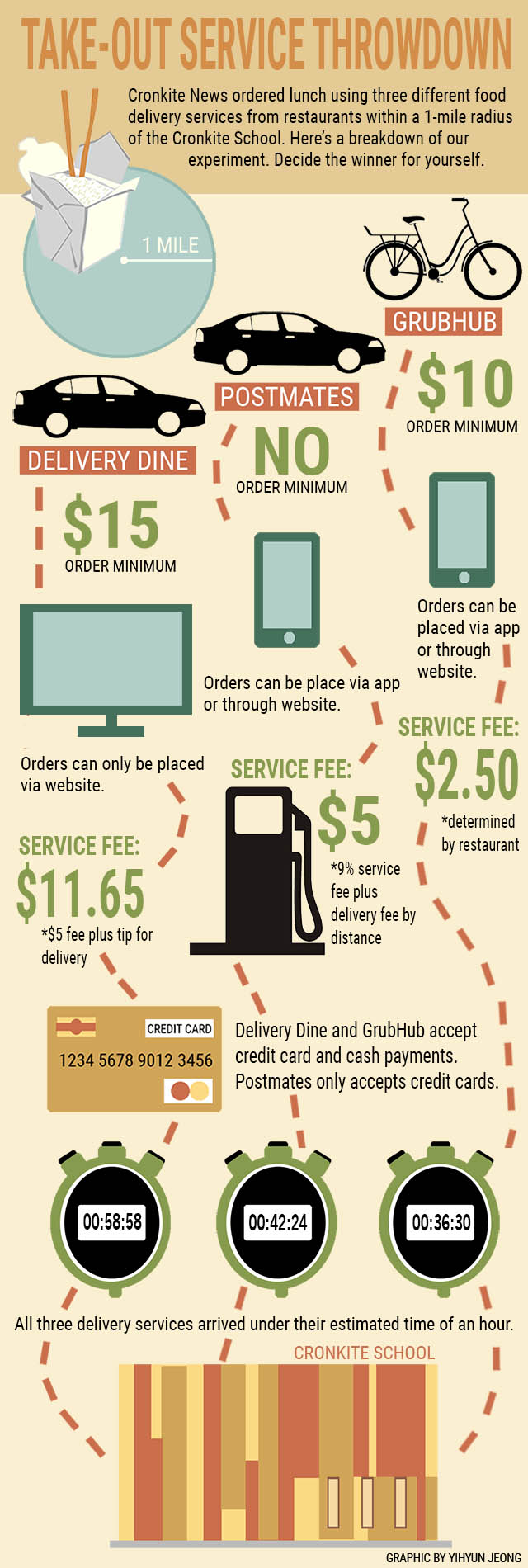Postmates expands on-demand delivery to Phoenix market
Postmates rapid growth
The company, which launched in 2011, reached its first 500,000 deliveries in 116 weeks, according to Postmates.
It reached one million deliveries 20 weeks after reaching its first 500,000, and 1.5 million deliveries just 10 weeks after reaching one million.
Consumers have consistently told companies they want their products and services immediately.
Right. This. Minute. (Or at least, as close as you can get.)
Several companies have stepped up to meet that “on demand” culture. San Francisco-based startupPostmates is the latest to enter the Phoenix market with its 24/7 courier service. The company promises to deliver goods from restaurants or stores in certain areas within an hour.
The concept of couriers is far from new. The idea traces back to America’s earliest roots, but Postmates looks much different than the Pony Express.
Founders Sam Street, Sean Plaice and Bastian Lehmann founded the company in 2011 after realizing the logistics of moving goods around a city weren’t up to speed.
“There was no easy way to move something from point A to point B,” Postmates spokeswoman April Conyers said, “so they created Postmates with the intention of solving that problem.”
Conyers said the company has had “huge growth.”
The company has raised more than $22 million in capital so far, according to venture capital company Spark Capital. Conyers said Postmates has about 8,000 couriers in 22 markets.
Conyers said consumer demand has fueled their success: “It’s the adoption of the on-demand kind of movement. Being able to get things when you want them is appealing.”
Douglas Olsen, an associate professor at the W.P. Carey School of Business at Arizona State University, agreed and said he believes businesses like this have adapted to our culture.
“There’s no question that we have become a fairly impulsive generation,” he said. “We do expect things to the extent that we can get them now with fairly minimum effort. That’s something that we have certainly been gravitating to.”
On March 12, the company expanded to Portland and Phoenix ¬¬– the company’s 21st and 22nd markets.
Given Postmates’ mission of becoming “the on-demand delivery infrastructure for every major city in the world,” the expansion to Phoenix was logical.
“Phoenix is a huge population,” Conyers said. “We saw a lot of potential there with the university, and we also had a lot of requests from people saying, ‘come to Phoenix.’ It was a natural progression.”
So how does Postmates work?
From either the Postmates app or website, you can search for stores or restaurants. You can choose from available menus or place a custom order if the menu isn’t listed. You pay directly through the app.
Similarly to Uber, you can track the status of your order in real-time. You also can tip your courier, rate them and leave feedback on the app. Customers pay a flat 9 percent service fee and are charged for delivery, calculated by distance.
Conyers said that in the first week in Phoenix, Postmates had already made hundreds of deliveries a day. “We’re happy to see that Phoenix is embracing us. We love Phoenix.”
The service area includes Phoenix, Scottsdale, Tempe and Mesa.
Postmates competes with other delivery services locally. And there’s also a national push by big companies like Amazon and Uber to enter the on-demand market.
GrubHub, which has been in Phoenix since 2011, also delivers food, but it works with restaurants that already offer delivery.
Postmates will deliver from just about anyone.
Because of this difference in niche, Abby Hunt, director of public relations at GrubHub, said the market may have room for both services.
“We’re still thinking that our main competition is the paper menu and the old way that people order,” Hunt said. “We’ve spent a long time building up the biggest network in the country and in most major cities, so we’re pretty confident in the offerings that we’re able to provide the Phoenix area diners with.”
GrubHub has more than 980 Phoenix-area restaurants in its network and processes more than 200,000 orders a day nationally.
Conyers said Postmates also has benefitted local businesses.
“We have restaurants on the platform that before Postmates, they were getting like two or three takeout orders a week, and now they’re getting hundreds,” Conyers said. “We can really drive that growth, and we give you the option of delivery if you don’t have that yet. You don’t have to have your own fleet of drivers, you can just tap into ours.”

No comments:
Post a Comment